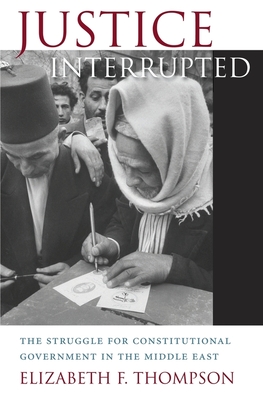

 Harvard University Press
Harvard University Press
Justice Interrupted: The Struggle for Constitutional Government in the Middle East


Key Metrics
- Elizabeth F Thompson
- Harvard University Press
- Hardcover
- 9780674073135
- 9.42 X 6.52 X 1.37 inches
- 1.78 pounds
- History > Middle East - General
- English
 Secure Transaction
Secure TransactionBook Description
The Arab Spring uprisings of 2011 were often portrayed in the media as a dawn of democracy in the region. But the revolutionaries were--and saw themselves as--heirs to a centuries-long struggle for just government and the rule of law, a struggle obstructed by local elites as well as the interventions of foreign powers. Elizabeth F. Thompson uncovers the deep roots of liberal constitutionalism in the Middle East through the remarkable stories of those who fought against poverty, tyranny, and foreign rule.
Fascinating, sometimes quixotic personalities come to light: Tanyus Shahin, the Lebanese blacksmith who founded a peasant republic in 1858; Halide Edib, the feminist novelist who played a prominent role in the 1908 Ottoman constitutional revolution; Ali Shariati, the history professor who helped ignite the 1979 Iranian Revolution; Wael Ghonim, the Google executive who rallied Egyptians to Tahrir Square in 2011, and many more. Their memoirs, speeches, and letters chart the complex lineage of political idealism, reform, and violence that informs today's Middle East.
Often depicted as inherently anti-democratic, Islam was integral to egalitarian movements that sought to correct imbalances of power and wealth wrought by the modern global economy--and by global war. Motivated by a memory of betrayal at the hands of the Great Powers after World War I and in the Cold War, today's progressives assert a local tradition of liberal constitutionalism that has often been stifled but never extinguished.
Author Bio
Elizabeth F. Thompson is a historian of social movements and liberal constitutionalism in the Middle East, with a focus on how race and gender have conditioned foreign intervention and the application of international law. She recently published her third book: How the West Stole Democracy from the Arabs: The Syrian Arab Congress and the Destruction of its Historic Liberal-Islamic Alliance (Atlantic Monthly Press, 2020).
It explores how and why Arabs gathered in Damascus after World War I to establish a democratic regime, in contrast to the prevalence of authoritarian-nationalist regimes established elsewhere in the lands of the defeated Ottoman and Habsburg Empires. The book also considers the long-term, negative consequences of the destruction of the Arab democracy, authorized by the Paris Peace Conference and enforced by the new League of Nations. Thompson is author of two previous books: Justice Interrupted: The Struggle for Constitutional Government in the Middle East (Harvard, 2013) and Colonial Citizens: Republican Rights, Paternal Privilege, and Gender in French Syria and Lebanon (Columbia, 2000), which won two national prizes.
She is currently working on two new books. The Deluge: A Hungarian in Istanbul Survives the Destruction of Two Empires after World War I is based on the darkly humorous memoir of Antoine Köpe, who fought alongside Turks in the Great War only to find himself stateless afterward. His family, which had prospered among Muslim Turks in the 19th century, found itself on the wrong side of the bloody and brutal new boundaries between Christian Europe and Muslim Middle East that were drawn after the Great War. Gone With the Wind in Cairo, explores the transnational politics of cinema and the renegotiation of racial and gender identities in 1940s-50s Middle East and the United States.
Source: American University - Washington, D.C.
Videos






Community reviews
Write a ReviewNo Community reviews